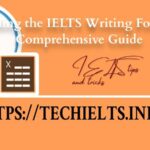This entire guide should help you grasp the IELTS Writing Rubrics. This article will help IELTS candidates who are not natural English speakers understand how examiners will evaluate their writing. The IELTS Writing Rubrics assess your ability to write clearly in English. Understanding these rubrics can help you write IELTS-compliant essays and earn a higher band score. Each IELTS Writing Rubric will be covered in detail in this tutorial. Writing ideas and strategies will also help you improve. Let’s explore IELTS Writing Rubrics!

Understanding the IELTS Writing Rubrics
What are IELTS Writing Rubrics? We must first understand that about them. They are crucial for writing evaluation. The rubrics ensure fair and consistent IELTS writing test grading. Their components are Task Achievement, Coherence and Cohesion, Lexical Resource, and Grammatical Range and Accuracy. Each element is judged using specific words and phrases, as explained below. If you understand these rubrics, you’ll know what examiners want and how they’ll score your work.
Importance of IELTS Writing Rubrics for non-native English speakers
IELTS Writing Rubrics help non-English speakers prepare for the test. These rubrics clarify the IELTS writing test, helping students understand what is expected of them. By understanding the rubrics, non-native English speakers can enhance their vocabulary and grammar, which affect their band score.
Understanding rubrics helps non-native English learners satisfy examiners’ expectations. Following the rubrics helps them demonstrate their vocabulary, grammatical range, consistency, and cohesiveness for a high band score. The rubrics also help non-English speakers improve their work. They describe the essential elements to help test-takers assess their writing and improve.
Purpose of IELTS Writing Rubrics
The IELTS Writing Rubrics score your work performance and answer for the question, and they provide precise comments on your writing. Graders evaluate your work based on how well you satisfied assignment requirements (task achievement) and explained your major ideas (task answer).
Job accomplishment involves satisfying the core idea, important characteristics, and cohesiveness and coherence standards. Task answer evaluates your core idea, logic, and response as a whole.
Examiners rate correctness using rubrics that consider grammar, vocabulary, punctuation, and verb forms. These scores are averaged to give your writing job a band score.
Knowing the rubrics helps you arrange your writing, answering the question appropriately, expressing your primary point, and making sense as a whole.
Deep Dive into IELTS Writing Rubrics
After understanding the value and purpose of IELTS Writing Rubrics, let’s delve into each criterion. We shall discuss Coherence and Cohesion, Lexical Resource, Grammatical Range, Accuracy, Task Achievement, and Task Response in the following sections. Understanding these crucial components can help you improve your IELTS writing test band score by revealing how to thrive in each subject. Let’s examine how to get good IELTS Writing Rubric scores.
Coherence and Cohesion in IELTS Writing
The IELTS Writing Rubric emphasizes coherence and cohesion. They evaluate writing flow and concept connections. How nicely phrases, paragraphs, and ideas flow is cohesion. Answer coherence is how logically you organize it.
Write about one major topic and build on it in each piece for clarity. Paragraphs should address different parts of the question or statement. Start each paragraph with a topic phrase that explains its purpose. Support your main concept with examples, explanations, or proof in supporting sentences.
Cohesion can be improved with linking words and phrases (but, thus, moreover) and reference words. Stronger writing skills connect sentences, phrases, and paragraphs for clarity and logic. Use the correct connections to show sentence and paragraph relationships to advance your ideas logically.
Avoid redundant concepts and words. Your answer may be illogical. To maintain flow and diversity, employ adjectives, synonyms, and transition words. To show the reader how your work is ordered, use commas, periods, and other punctuation symbols.
Working on coherence and cohesiveness can help you develop a well-structured answer that conveys your primary arguments and showcases your writing skills.
Lexical Resource in IELTS Writing
Lexical resource is another important part of the IELTS Writing Rubrics. It checks your language range, accuracy, and ability to put words together. To get good grades on lexical resource, try to use a lot of different words correctly and in the right way.
Here are some ways to make your vocabulary resource better:
When it makes sense, use academic and special vocabulary to show that you can explain complicated ideas and concepts.
Instead of using the same words and sentences over and over, use synonyms to show how big your vocabulary is.
To improve your vocabulary, use word-formation methods like affixation (adding prefixes or suffixes) and word groups.
Add words that are appropriate for a range of IELTS topics, such as intellectual and general words.
Read a lot, watch English-language movies, and interact with a lot of different written and spoken English sources to build your knowledge.
By adding to your vocabulary, you can make your work more complex, showing that you have a good grasp of words and raising your overall band score.
Grammatical Range and Accuracy in IELTS Writing
It is important to know the difference between grammatical range and uniformity when you are writing for the IELTS. One way to improve your grammar range is to use complex language and different sentence structures. You can also improve your language by proofreading your work and using tools that check for mistakes. Stick to basic language rules like subject-verb agreement and change of mood when you’re writing for the IELTS. In the IELTS writing rubrics, range and clarity of grammar are given grades that have a big impact on the overall score. It’s helpful for your work if you know a lot about grammar and phrases. Also, don’t forget that simple words can help you learn a lot of grammar.
Task Achievement and Task Response in IELTS Writing
The IELTS Writing test grades pupils on Task Achievement and Task Response. It evaluates how well a candidate answers the writing question, summarizes the important points, provides specifics, and stays on topic. These factors can be better understood and managed with British Council resources. Candidates should practice using simple sentences, a variety of language, and proper grammar. Understanding these standards is crucial for Academic or General Training students. Clauses promote writing flow and uniformity, which can boost grades. Facebook and Instagram offer IELTS study groups and other resources..
Understanding Task Achievement in IELTS Writing
Do what you’re told on the IELTS writing test if you want to do well. Your answer should fully answer the question and make your point clear the whole time. As the prompt says, it should have all the important parts, a clear outline, and key ideas that are shown, developed, and backed up. You can show that you have done the job by using relevant examples to back up your points. Your answer will also be better if you use a range of sentence structures and clear words. This will help you do better on the job. You might want to write more complex and easy sentences as well as different kinds of clauses to improve your grammar range and accuracy..
Examining Task Response in IELTS Writing
Find out how the grade will be given before you look at the IELTS writing job answer. This talks about how well the answer makes the point clear, answers all parts of the question, and gives long, important examples. This is something that both the British Council and General Training stress, and they both want applicants to write in a way that fits the job. There are also more simple sentences and different types of clauses, which show that a lot of different right grammar choices were made. It can also help to use social media sites like Instagram and Facebook together to think and learn new things.
Aligning Your Writing to Meet IELTS Standards
Preparing for the IELTS writing test requires you to write to British Council standards. Use short sentences to demonstrate your linguistic skills. Make sure your sentences are concise. Check grammar range and choice. Use varied clauses to demonstrate sentence pattern proficiency. Read and practice the British Council’s writing instructions to do well on the academic or general training test. Learning writing and getting criticism on Facebook and Instagram can also be helpful.
Strategies to improve Coherence and Cohesion
Use multiple cohesive approaches to make your IELTS writing more coherent. Use proper paragraph patterns to make your writing more cohesive and ensure your ideas flow. To keep your writing coherent, utilize proper punctuation and seamless phrase transitions to move your thoughts. To improve your writing, employ short phrases, clauses, and a variety of syntax. These ideas will improve your IELTS writing and exam outcomes by making it more coherent and organized.
Enhancing Lexical Resource in your writing
Use a variety of words to demonstrate your ability to form and choose natural words to improve your writing. Using more words for different IELTS subjects will increase your vocabulary. Use simple phrases, a variety of grammar rules, and diverse grammar options to improve your writing. You can also learn about words and training from the British Council and Facebook and Instagram.
Improving Grammatical Range and Accuracy
To improve your grammatical range and precision, use several grammar structures correctly. Correct word forms are essential for grammatical proficiency. Grammar should improve with tiny mistakes, but creating small mistakes can enhance it. Use complex sentences to demonstrate a wider range of grammar skills and more accurate grammar in a more difficult way. You need a mix of basic and complex sentences and well chosen clauses to achieve excellent grammatical accuracy and range.
Navigating Task Achievement and Task Response
If you want to use the Task Achievement and Task Response parts of the IELTS writing rubrics, you need to know how to judge them. The British Council talks about these things in a useful way, stressing how important it is to use simple lines and a lot of different types of grammar. People who are taking either the Academic or General Training test need to be careful with their grammar and know how to use words to make their points clear. Facebook, Instagram, and other social media sites have become more important for conversation. To do your job, you need to know how they change the way people use language.
Techniques to excel in Task Achievement
If you want to do well on the IELTS writing task, you need to use correct language. A better score will help you do the job better, and make sure that harmony and coherence features are used. Grammar range and grammar choice are important to pay attention to because they can get in the way of getting things done. Using lexical tools can also help you do much better on the IELTS writing task. IELTS writing tests are important whether you are taking them for school or just for fun, so make sure you know these tips.
Mastering Task Response
To demonstrate your IELTS task answer writing skills, you must be correct on several grammar concerns. To be coherent, choose your words carefully and use short phrases and clauses to connect your ideas. Using a variety of vocabulary and arranging paragraphs logically can also improve performance. Candidates who understand language choice and apply it correctly will do better. Candidates can improve their IELTS scores by mastering task responses using these tactics.
How can understanding IELTS Writing Rubrics boost your score?
You can get a much better score on the IELTS Writing Rubrics if you know what they are. Learning the rubric will help you reply to assignments, finish assignments, understand what you’re writing, use a wider range of words, and make sure your grammar is correct. You need to know what the scoring is all about if you want to get a better overall score.
Frequently Asked Questions
What is the purpose of IELTS writing rubrics?
The point of IELTS writing rubrics is to give a standard way to rate writing skills. These rubrics rate different parts of writing, like job completion, vocabulary, organization and cohesion, and the use of proper grammar. They make sure that everyone’s writing skills are rated the same way every time. This helps people prepare well for the IELTS writing test.
How are IELTS writing tasks evaluated and scored using the rubrics?
For the IELTS writing tasks, there are four things that are used to score them: Task Achievement, Coherence and Cohesion, Lexical Resource, and Grammatical Range and Accuracy. The scores range from 0 to 9 for each item on the list. The total band score is found by taking the average of all the scores. In the rubrics, it’s clear what is expected at each band level. When you know the rubrics, you can see what you need to work on.
What are the key components that contribute to a high-scoring IELTS writing response?
Pay attention to task completion, coherence and cohesion, lexical resource, and grammatical range and accuracy if you want to get a high score on the IELTS writing test. Answer the question correctly, make sure the structure and flow are smooth, use a lot of different words, and show you know how to use language correctly.
Conclusion
To conclude, non-native English learners must understand the IELTS Writing Rubrics to succeed. You can easily grade your writing using these rubrics. Pay attention to how effectively your writing flows, how many words you use, how correct your grammar is, how well you finish the job, and how well you answer the question to improve and fulfill IELTS requirements. You can improve these skills by organizing your thoughts, learning new vocabulary, and practicing good grammar. Learning the fundamental components of a high-scoring IELTS Writing answer can boost your score. Read the rubrics, enhance your skills, and write well to get the number you want.






